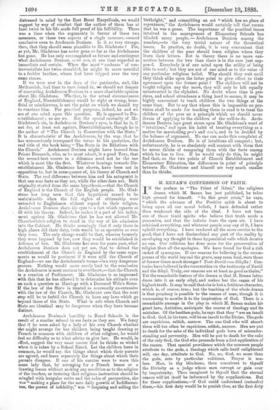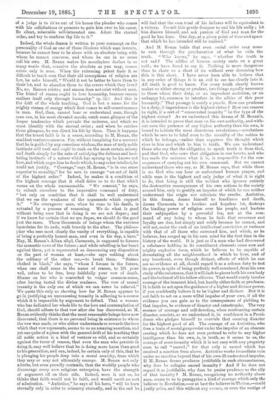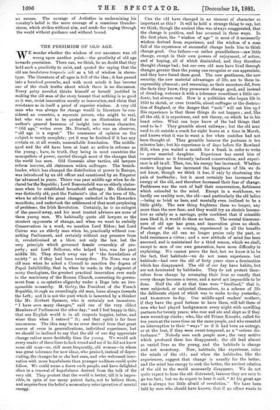M. BENIN'S CONFESSION OF FAITH
TN the preface to "The Priest of Mimi," the religions drama which M. Renan has just published, he takes high ground for himself. "In this great crisis," he says, " which the advance of the Positive spirit is about to bring upon all our moral beliefs, I have defended rather than weakened the side of the ideal. I have not been one of those timid spirits who believe that truth needs a penumbra, and that the infinite fears the open air. I have criticised everything, and whatever people may say of it, I have upheld everything. I have rendered all the more service to the good, that I have not dissimulated any part of the reality by enveloping my thought in those hypocritical veils which deceive no one. Our criticism has done more for the preservation of religion than all the-apologies. We have found for God a rich casket of synonyms. If our reasons for believing in the recom- penses of the world beyond the grave, may seem frail, were those of former times much stronger Testa David cues Sibylla ! Cen- turies have believed in the resurrection on the testimony of David and the Sibyl. Truly, our reasons are at least as good as theirs," Yet the remarkable feature of the drama is that M. Renan intro- duces into it an early sibyl, and makes her the organ of his highest truth. It may be said that she is but a fictitious character, which is, of coarse, true; but the teaching of the whole drama is that prophecy is possible to the reason of man, though it is unmeaning to ascribe it to the inspiration of God. There is a remarkable passage in the play in which M. Renan makes his great hero, Antistius, anticipate the course of theology and its mistakes. Of the heathen gods, he says that they " are an insult to God. God, in his tarn, will be an insult to the Divine. The gods are capricious, selfish, narrow. The one God who will absorb them will too often be capricious, selfish, narrow. Men are put to death for the sake of the individual gods born of misunder- standing and perversity. Men will be put to death for the sake of the only God, the God who proceeds from a first application of the reason. That special providence which the common people attribute to the gods, a theology which calls itself enlightened will, one day, attribute to God. No, no, God, no more than the gods, acts by particular volition. Prayer is use- less. Man, in thy blindness, then conceivest to thyself the Divinity as a judge whom men corrupt or gain over by importunity. Thou imaginest to thyself that the eternal reason will let itself be influenced by thy supplications. But for these supplications,—if God could understand (entendre) them,—his first duty would be to punish thee, as the first duty
of a judge is to drive out of his house the pleader who comes with his solicitations or presents to gain him over to his cause. Be silent, miserable self-interested one. Adore the eternal order, and try to conform thy life to it."
Indeed, the whole drama is written to pour contempt on the personality of God as one of those illusions which man invents, because he cannot bear to be alone with an absolute being with whom he cannot converse, and whom he can in no sense call his own. 31. Renan makes his mouthpiece declare in so many words that, conceive the absolute as you may, reason exists only in man. When the reforming priest finds it so difficult to teach men that their old conceptions of religion are low, he asks himself, " Would it not be better to leave them to their lot, and to abandon them to the errors which they love ? No, no. Reason exists ; and reason does not exist without man. The friend of reason ought to love humanity, because reason realises itself only through humanity." (p. 52.) And this is the drift of the whole teaching. God is but a name for the mighty stream of energy which first comes to self-consciousness in man. God, then, cannot hear or understand man, though man can, in his most elevated moods, catch some glimpse of the deeper tendencies which pervade the universe, and which we must identify with the eternal order ; and when he catches those glimpses, he can direct his life by them. Thus it happens that the truest faith is in a sense, according to M. Renan, the maddest venturesomeness. For, without imagining for a moment that he is guided by any conscious wisdom, the man of truly noble instincts will rush and ought to rush on the most certain misery and death simply for the sake of satisfying the dubious and hesi- tating instincts of a nature which has sprung up he knows not how, and which urges him to deeds which, to any sober intellect, he could not justify. " Courage," says M. Reran, " is in one sense superior to morality," for he sees in courage "an act of faith of the highest order." Indeed, he makes it a condition of the highest courage that it shall drive us to do that which seems on. the whole unreasonable. " We consent," he says, to submit ourselves to the imperative command of duty, " but only on condition that it shall be well understood that we see the weakness of the arguments which support it." "No courageous man, when he runs to his death, is actuated by a process of reasoning. We do what is good withont being sure that in doing it we are not dupes ; and if we know for certain that we are dupes, we should do the good just the same. Those thousands of beings whom the universe immolates for its ends, walk bravely to the altar. The philoso- pher who sees most clearly the vanity of everything, is capable of being a perfectly honest man, and even in his day, a hero." Nay, M. Renan's Alban sibyl, Carmenta, is supposed to foresee the monastic vows of the future ; and while rebelling in her heart against them, yet is represented as denouncing any disposition on the part of woman at least,—she says nothing about the celibacy of the other sex,—to break them. "Sisters clothed in black," she says, " whom I foresee in the future, when one shall come in the name of reason, to lift your veil, refuse to be free, keep faithfully your vow of death. Shame on her who is converted to vulgar common-sense, after having tasted the divine madness. The vow of sacred insanity is the only one of which we can never be relieved." We quote this only as showing how far M. Renan appears to go in justifying an unreasoning tenacity in adhering to a course which it is impossible by argument to defend. That a woman who has dedicated her whole life to the love and contemplation of God, should adhere to that vow after she has discovered, as 11. Renan evidently thinks that the most reasonable beings have now discovered, that there is no personal being in existence to whom the vow was made, or who either understands or rewards the love which that vow represents, seems to us an amazing assertion, and yet one quite of a piece with the general drift of his teaching that all noble action is a kind of venture so wild, and so certainly against the tenor of reason, that even the man who persists in doing it, may well believe that he is doing more harm than good to his generation, and can, indeed, be certain only of this, that he is plunging his people deep into a moral anarchy, from which they may or may not ultimately emerge. M. Renan not only admits, but even proudly contends, that the worldly people who discourage every nem religious enterprise, have the strength of argument all on their side. Indeed, were it not so, he thinks that faith would not be faith, and would merit no sort of admiration. "Antistius," he says of his hero, " will be born eternally only in order to miscarry eternally, and in the end he
will find that the sum total of his failures will be equivalent to a victory. Permit this gentle dreamer to end his life sadly ; him disown himself, and ask pardon of God and man for the good he has done. One day, at a given point of time and space that which he has intended will be realised."
And M. Renan holds that even social order may come to ruin through the proclamation of what he calls the truth. "Who knows," he saye, " whether the truth is not sad ? The edifice of human society rests on a great void ; we have dared to say it. Nothing is more dangerous than to skate on a sheet of ice without ever dreaming how thin is this sheet. I have never been able to believe that in any order of things it is an evil to see too clearly into it. All truth is good to know. For every truth clearly known makes us either strong or prudent, two things equally necessary to those whom their duty, or an imprudent ambition, or an unhappy lot, summon to interfere in the affairs of this poor humanity." That passage is surely a puzzle. How can prudence be a duty, if imprudence is the highest virtue ? How can reserve be right, if a sort of " consecrated insanity " be the type of the highest virtue? As we understand this drama of M. Renan's, it is intended to prove that man on his own authority, and with- out even the pretence of any higher authority than his own, is bound to initiate the most disastrous revolutions,—revolutions which he sees to be fatal even to the morality of the nation to which he belongs,—rather than suppress the thought which rises in him and which to him is truth. We can understand those who say that the obligation to speak truth is from God, and that God, who sows that obligation in our hearts, and who has made the universe what it is, is responsible for the con- sequences of carrying out his own command. But we cannot understand those who say, as M. Renan says, that while there is no God who can hear or understand human prayer, and while man is the highest and only judge of what it is right to do, that being is still the noblest who ignores entirely the destructive consequences of his own actions in the society around him, only to gratify an impulse of which he can neither understand the origin nor calculate the results. Antistius, in this drama, dooms himself to loneliness and death, dooms Carmenta to a loveless and hopeless lot, destroys the binding power of religion over his people, and hastens their subjugation by a powerful foe, not at the com- mand of any being to whom he feels that reverence and loyalty are due, but simply and solely because he cannot, and will not, resist the rush of an intellectual conviction at variance with that of all those who surround him, and which, as he believes, has surged up in his own mind for the first time in the history of the world. It is just as if a man who had discovered a substance holding in its constituent elements some new and mighty explosive force, which he believes to be capable of devastating all the neighbourhood in which he lives, and of any beneficent, even though distant, effects of which he can see no evidence at all, should regard it as a solemn duty to test its power, in spite of being perfectly well convinced, from his own study of the substance, that it will dash to pieces both his own body and the bodies of all his fellow-citizens. That would surely involve courage of the insanest kind, but hardly either faith or prudence. It is faith to act upon the guidance of a higher and diviner power, if you confidently believe it to be higher and diviner. But it is not faith to act on a mere wilful impulse of your own, if all the evidence you can gain as to the consequences of yielding to that impulse, be evidence of disaster and catastrophe. The very essence of courage and self-devotion, when confronting certain disaster, consists, as we understand it, in confidence in a Provi- deuce who pledges himself to overrule that seeming disaster for the highest good of all. The courage of an Antistius, who fires a train of moral gunpowder under the impulse of an obscure craving which he does not even pretend to refer to any higher intelligence than his own, is, in truth, as it seems to us, the courage of mere insanity which it is not easy with any propriety even to call " sacred ;" for that only is sacred which has received a sanction from above. Antistius works immediate ruin under no sanction beyond that of his own ill-understood impulse. If M. Renan deems prudence justifiable in such circumstances, why does he eulogise sacred insanity P And if he does not regard it as justifiable, why does he praise prudence as the ally of that insanity P M. Renan, recognising no authority above man, seems to us to panegyrise a kind of courage which only the believer in Revelation,—or at best the believer in Theism,—could justly prize, and this without any excuse, or even the vestige of
an excuse. The courage of A ntistius in undermining his country's belief is the mere courage of a conscious thunder- storm, which strikes without aim, and sends fire raging through the world without guidance and without bound.












































 Previous page
Previous page